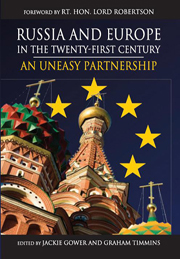Book contents
- Frontmatter
- Contents
- List of Contributors
- Acknowledgements
- List of Abbreviations/Acronyms
- Foreword Russia and Europe
- Preface
- Introduction Russia and Europe: What Kind of Partnership?
- PART 1 Russia looking West
- PART 2 Europe looking East
- Chapter 7 The European Union's Policy on Russia: Rhetoric or Reality?
- Chapter 8 The Role of Norms and Values in the European Union's Russia Policy
- Chapter 9 NATO and Russia: Progress or Process?
- Chapter 10 German-Russian Bilateral Relations and EU Policy on Russia: Reconciling the Two-Level Game?
- Chapter 11 Shortcut to Great Power: France and Russia in Pursuit of Multipolarity
- Chapter 12 A Europe Divided by Russia?: The New Eastern Member States and the EU's Policy towards the East
- PART 3 Partnership in Practice
- Conclusion Russia and Europe: An Uneasy Partnership 289
- Index
- More Titles in this series
Chapter 8 - The Role of Norms and Values in the European Union's Russia Policy
from PART 2 - Europe looking East
Published online by Cambridge University Press: 05 March 2012
- Frontmatter
- Contents
- List of Contributors
- Acknowledgements
- List of Abbreviations/Acronyms
- Foreword Russia and Europe
- Preface
- Introduction Russia and Europe: What Kind of Partnership?
- PART 1 Russia looking West
- PART 2 Europe looking East
- Chapter 7 The European Union's Policy on Russia: Rhetoric or Reality?
- Chapter 8 The Role of Norms and Values in the European Union's Russia Policy
- Chapter 9 NATO and Russia: Progress or Process?
- Chapter 10 German-Russian Bilateral Relations and EU Policy on Russia: Reconciling the Two-Level Game?
- Chapter 11 Shortcut to Great Power: France and Russia in Pursuit of Multipolarity
- Chapter 12 A Europe Divided by Russia?: The New Eastern Member States and the EU's Policy towards the East
- PART 3 Partnership in Practice
- Conclusion Russia and Europe: An Uneasy Partnership 289
- Index
- More Titles in this series
Summary
Introduction: Norms, Values, and EU Foreign Policy*
For the European Union (EU), the link between norms, values and foreign policy seems to be an obvious one. For example, the new Constitutional Treaty spells out the set of values on which the Union's external action is based: democracy, the rule of law, the universality and indivisibility of human rights and fundamental freedoms, respect for human dignity, the principles of equality and solidarity, and respect for the principles of the United Nations Charter and international law. In the treaty, the development of relations with third parties is made conditional upon sharing and upholding them.
In its external action the Union thus wants to be seen as an essentially normative power. This emphasis is understandable not only in the light of the EU's own history as a successful economic project based on political reconciliation between former deadly foes, but its current postmodern, or civilian power nature as well. Despite the recent and hectic work on the development of its military crisis-management capabilities, the Union still largely lacks the traditional (military) means of coercion, and is consequently forced to rely on ‘ softer’ means for influence and persuasion instead. Moreover, it needs to be stressed that this choice is not merely practical, reflecting the lack of means, but it also stems from the Union's self-conception (or identity) as a new and qualitatively different international actor that shuns away from traditional modes of ‘ power politics’ and seeks to promote a ‘ rule-based international order’ in its stead.
- Type
- Chapter
- Information
- Russia and Europe in the Twenty-First CenturyAn Uneasy Partnership, pp. 133 - 148Publisher: Anthem PressPrint publication year: 2007
- 1
- Cited by



